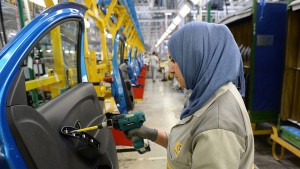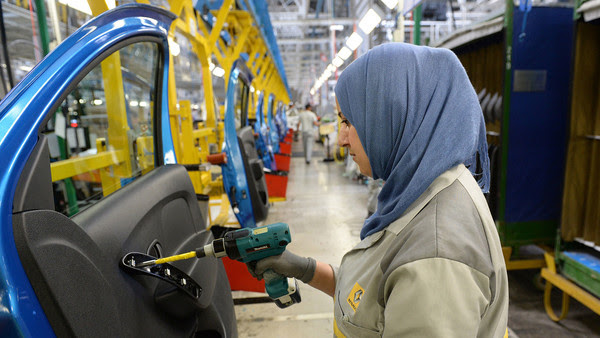Financial Times
www.ft.com
Heba Saleh

A special train takes cars assembled in Renault’s factory in northern Morocco to Tanger-Med port, half an hour away. It is then a short trip on a car carrier to the European markets where they are sold.
The plant, which produced 229,000 cars in 2015, up from export 174,000 the year before, is the largest car factory in Africa with capacity to produce 340,000 vehicles annually. The bulk of its output is destined for Spain, France and Germany.
“We are in a perfect location at the gates of Europe,” says Jean-François Gal, director of the Renault factory.
For Morocco, the benefits of Renault’s €1.6bn investment in the factory go far beyond the 7,100 jobs it has created. The plant started production in 2012. It has served as a catalyst for the government’s plans to develop an automotive sector that benefits from the country’s proximity to European markets and cheap labour costs: Moroccan car workers earn about a third of their European peers.
The Renault plant, along with a range of tax and other incentives offered in Morocco’s free trade zones, has also attracted foreign makers of car parts. Some 150 automotive-related manufacturers are based in Morocco, according to Hakim Abdelmoumen, president of the Moroccan Association for Automotive Industry and Trade. Some supply the Renault plant but others produce solely for export to Europe and elsewhere.
The expanding automotive industry, with its widening supply chain, has also convinced PSA Peugeot Citroën, the French carmaker, to open a plant in Kenitra on Morocco’s Atlantic coast. This will be completed in 2019, with an initial capacity to produce 90,000 vehicles annually, rising within three years to 200,000, which will be made mainly for export to African markets.
Mr Abdelmoumen says most international companies that built plants in Morocco have added to them. “Sumitomo, Yazaki and Valeo are all huge automotive companies that tested Morocco with a plant and they are now accelerating investment,” he says.
Tajeddine Bennis, director of Snop Tanger, a French maker of body parts for Renault that started production in Morocco in 2011, says turnover has grown faster than he had expected.
“We reckoned it would be in the order of €30m a year, but we reached €50m last year,” he says. “We were worried about the quality of the local workforce, but our strategy of training youth from local schools has yielded better results than we expected.”
Snop Tanger employs 420 Moroccan workers and exports 30 per cent of its production to Renault plants in Colombia, Brazil, India and South Africa. The rest of its output goes to the Moroccan plant.
With total automotive exports reaching €4.8bn in value last year, the sector is seen as one of Morocco’s big success stories.
Mr. Abdelmoumen says the sector is aiming to create 90,000 jobs by 2020 in addition to the 100,000 that already exist.
As part of this, the country’s ministry of industry is supporting automotive-related manufacturing in four specific areas: batteries; seats and interiors; cables and wiring; stamping and metal parts.
FT Special Report
Doing Business in Morocco
King Mohammed VI (centre), his son Prince Moulay Hassan (left), his wife Princess Lalla Salma (right)
Businesses have been expanding in Africa to make up for slow growth at home.
One aim is to increase the proportion of locally produced components in exported cars from 40 per cent to 65 per cent by the end of the decade.
A consequence of the arrival of so many foreign companies, says Mehdi El Idrissi, a Moroccan consultant working for Paris-based recruiters Eurosearch & Associés, has been the rise in demand for Moroccan managers with experience of working for international companies. It has led to the beginnings of a reverse brain drain, with qualified Moroccans from the large diaspora in Europe returning to work in top jobs in the auto industry and the much smaller aeronautics sector.
“There are 4.5m Moroccans outside the country,” says Mr Idrissi. “We are now helping several companies looking for Moroccan executives. The main requirement is that they should be top managers able to follow the guidelines of their headquarters, but also to fit into the Moroccan ecosystem. We have 10 companies launching business in Morocco and looking for managers, seven in the auto sector and three in aeronautics.







